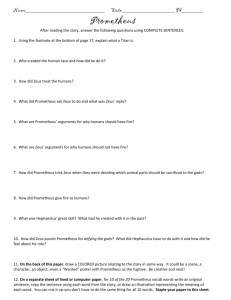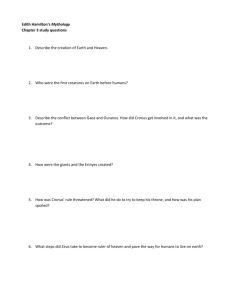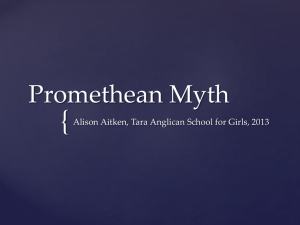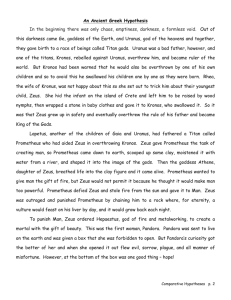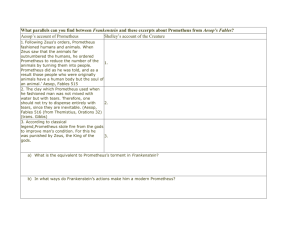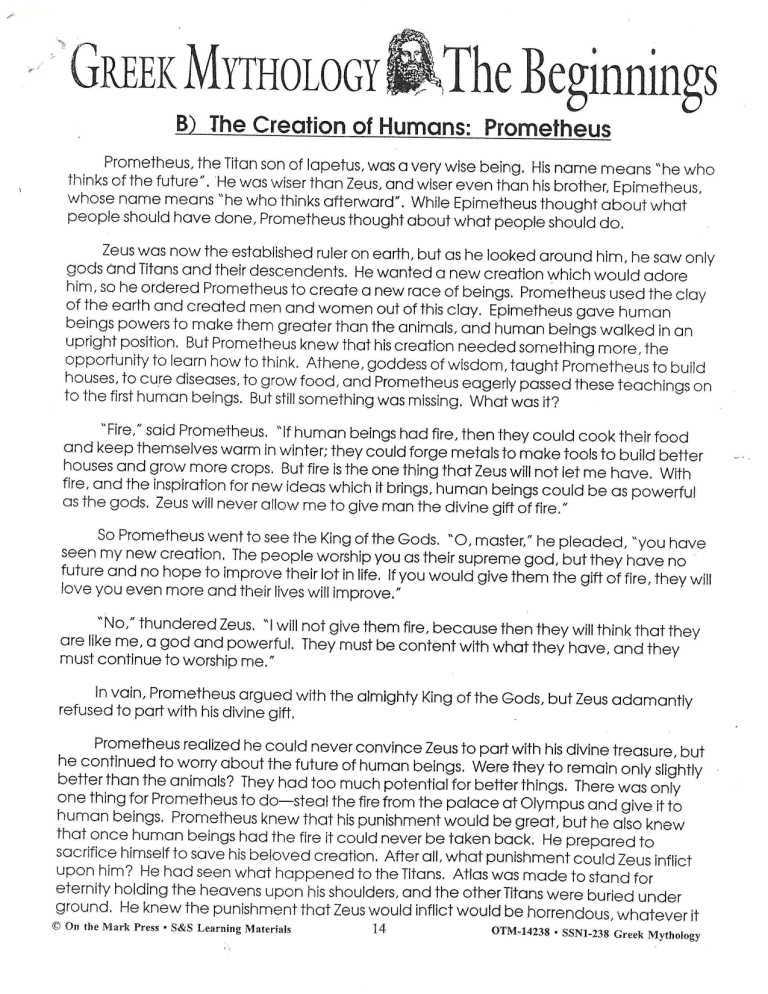
B) The Creation of Humans: Prometheus Prometheus, the Titan son of lapetus, was a very wise being. His name means “he who thinksof the future”. He waswiser than Zeus, and wiser even than his brother, Epimetheus, whose name means “he whothinks afterward”. While Epimetheus thought about what people should have done, Prometheus thought about what people should do, Zeus was now the established ruler on earth, but as he looked around him, he saw only gods andTitans and their descendents. He wanted a new creation which would adore him, so he ordered Prometheusto create a new raceof beings. Prometheus used the clay of the earth and created men and womenoutof this clay. Epimetheus gave human beings powers to make them greater than the animals, and human beings walked in an uprightposition, But Prometheus knewthathis creation needed something more, the opportunity to learn how to think. Athene, goddess of wisdom, taught Prometh eusto build houses, to cure diseases, to grow food, and Prometheus eagerly passed these teachings on to thefirst human beings. Butstill something was missing. What wasit? “Fire,” said Prometheus. “If human beings had fire, then they could cook their food and keep themselves warm in winter; they could forge metals to make tools to build better houses andgrow more crops. Butfire is the one thing that Zeus will not let me have. With fire, and the inspiration for new ideas which it brings, human beings could be as powerful as the gods. Zeus will never allow me to give man the divinegift offire.” So Prometheus wentto see the King of the Gods. “O, master,” he plead ed, “you have seen my new creation. The people worship you astheir supreme god, but they have no future and no hopeto improve their lotinlife. If you would give them thegift offire, they will love you even more and theirlives will improve.’i" “No,” thundered Zeus. “I will not give them fire, because then they will think that they are like me, a god and powerful, They must be content with what they have, and they must continue to worship me.” In vain, Prometheus argued with the almighty King of the Gods, but Zeus adamantly refused fo part withhis divinegift. Prometheusrealized he could never convince Zeus to part with his divine treasure, but he continued to worry about the future of human beings. Were they to remain only slightly better than the animals? They had too much potential for better things. There was only one thing for Prometheus to do—steal! thefire from the palace at Olymp us and giveit to human beings. Prornetheus knew that his punishment would be great, but he also knew that once human beings had the fire it could never be taken back. He prepared to sacrifice himself to save his beloved creation. After all, what punishmentco uld Zeusinflict upon him? He had seen what happened to the Titans. Atlas was made to stand for eternity holding the heavens upon his shoulders, and the otherTitans were buried under ground, He knew the punishmentthat Zeus would inflict would be horren dous, whateverit © On the Mark Press * S&S Learning Materials 14 OTM-14238 + SSN1-238 Greek Mythology ~ Greak MyraoocyThe Beginnings & was, But he was prepared to sacrifice everything for humankind. One night, when he thought the gods would all be sleeping, Prometheus arranged with Atheneto let him into the greatfire chamberof the palace at Mount Olympus. There, . he knew,Apollo, the god of the sun, would leavehis fiery chariot that he daily drove throughtheskies, bringing light and warmth to the earth below, “Is everyone asleep?” he whispered to Athene. “Yes, | think so, but you must be very careful,” she answered, her voice asstill as she could makeit, “You know whathewill do to you if he catches you?” “| know,” replied Prometheus, and he beganto question if it was all worth it. But he was resolved to help human beings to reach their full potential, “What will happen to me if he catches me is whatwill happen when he finds out that | have stolen the sacred fire, My fate is already determined. | must make sure that! am successful, that | steal the sacred fire and give it fo humankind. Then Zeus can never takeit back, and | willingly bear any punishmentthe tyrant mayinflict on me.” With these words, Prometheus cautiously opened the door and looked into the chamber. There was the chariot, and there the horses, and thefire lit up the room with a blindinglight. But the Titan, now more determined than ever that humans must possessthis great gift, moved forward, took a dry reed from its sconce in the wail and lit it. Within seconds, he was gone, and the world was about to change, not only the world of humankind, but also the world of Prometheus! Prometheus went from Mount Olympus to the earth below and setfire to some dead trees and twigs and dry leaves, creating a fine bonfire. Then he waited to see what would happen next. As Prometheus watched, he sawthefirst human beings awaken and gazein bewilderment atthis bright, new, warm thing. With delight, they moved towardsit, butits heat wasso intense that they quickly moved back from it. Prometheus knew that he would have to teach humansbeingsto use the fire wisely, and he set aboutthis task so patiently that soon people were using thefire to cook meat and to forge metals. Atfirst they were afraid, but they soon learned howto usefire wisely. ~ Up in his palace on Olympus, Zeus slowly began to wake up. Last night had been a wonderful time for him, partying with Dionysus, the god of wine, and carousing with the satyrs; he had been out late, and so he thought he would sleepin, even though it was now well past noon. “After all,” he thought, “I’m king of the gods. | can do what| please.” Still not quite awake he moved towards the window which looked down from Mount Olympus on the earth below. “Yes. Everything is quite well. There are my people, who worship me and know just how wonderfull am, Look at that—they’re even cooking their food. It’s. a goodfeeling to know | am loved. They’d better be careful with thatfire, though....” © On the MarkPress * S&S Learning Materials . 15 OTM-14238 + SSN1-238 Greek Mythology GreekMyrxorocyiThe Beginnings “Fire! Where did they getfire?” thundered the king of the gods. Suddenly, he was no longer groggy, but fully awake, “Who has donethis fo me? Who hasstolen myfire and given it to human beings?” Even when he wasfully awake, Zeus wasnotusually a quick thinker. But finally it dawned on him: “What wasit Prometheus wanted from me the other day? Yes! My fire! Prometheus has donethis dastardly deed!” “Bring Prometheus to me at once!” Zeus’s voice exploded through theskylike Inap eet. “Drag him hereif you have to,” he bellowed to his private guards. But the guards did not have to movefar to find Prometheus. The titan was already at the palace, waiting to receive his punishment. Calmly Prometheus moved towardshis master. “You summoned me, O mighty Zeus?” “Why did you defy my orders?” stormed the king of the gods. “You knew | did not want human beings to havefire. Now they can become as powerful as | am.” “They will never be as powerful as you, my noble master. After all, they’re only human beings, not gods. They’re small and insignificant. What can they dowithfire, compared to your thunderbolts?” Prometheus thought he could trick Zeuswith flattery. “You can destroy all of them in amoment, ifyou wanted to.” “Perhapsyou are right.” Zeus began to calm down somewhat, but there was something malevolentin his new attitude. “But you—you have already defied me once, and | can neverforgive that. | am the king of the gods and you, my servant, have disobeyed mydirect orders, You will be punished.” “| Know that| willbe punished, and | accept that,” replied Prometheus with a quiet dignity. “lonly isis that you makeit swift, whatever my punishment maybe. Kill me now, if you wish.” “No. | don’t think that is my wish,” sneered the master of Olympus. “I think | will make your punishment an example to all human beings or any creatures who think they can defy me. No. It willbe something slow, something thatwill last an etermity—and youwill regret that you ever disobeyed me. And people will see your fate and know whatit is to defy the king of the gods,” So, Zeus called forhis son, the deformed blacksmith, Hephaestus, wholived and worked athis forge under a mountain. “Make the hottestfire you can and forge for me chains that are so strong that not even a titan can break them. Then takethis traitor, Prometheus, and chain him to thecliffs of Mount Caucasus. The chains must be so strong that eternity will not weaken them,” © On the Mark Press « S&S Learning Materials 16 OTM-14238 * SSN1-238 Greek Mythology “|obey, my father,” said the blacksmith god. Then Hephaestus returned to his forge and took the strongest and thickestiron he could find. He hammered for days in the heat of the fire, and forged the metal into chains that no one could break, that time would never erode in a thousand millennia. Then Hephaestus returned to his father, Zeus. “Here, my father, is what you requested—the chains which will last for eternity. No one and nothing can ever breakthese chains.” “Good,” smiled Zeus, wallowing in his revenge. “Good. You have never failed me, my son, Guards, send for Prometheus, whois waiting in my dungeons below, Take him and chain him to the highcliffs of Mount Caucasus.” Through these days, Prometheus had rested on a stoneslab in the dungeonsof Zeus’s palace. “My punishment doesn’t seem so bad,” he thought. “What could be worse, sitting here on this cold stone or being chainedto a cliff?” He tried to be optimistic. “At least the view will be better.” So Prometheus was taken from his cell and chained to the rocky sides of Mount Caucasus, where the cold winds and salty waves dashed against his body, But Zeus was notfinished with his plan. Punishment for Prometheus must be somethingtruly horrible. So Zeus sent a vulture to Prometheus as he was chainedto the rock and the vulture devoured his intestines and his liver. At night the intestines and liver grew back, but the next day the vulture returned to feast once again. And this was intended to last for eternity, an eternity of pain and torture andsuffering for the once proudtitan who defied the greatest of the gods. However, as you will learn later, a great hero, Heracles (ihe Romans called him Hercules) would eventually free Prometheus from his pain and torment. And Prometheus withstood the pain and thetorture and the suffering, for he knew he had given human beingsthe greatest gift—the gift of hope and the imagination, a gift that would make them progress, a gift that would make them less dependent on the whimsof an angry and egocentric god. © On the Mark Press * S&S Learning Materials 17 OTM-14238 * SSN1-238 Greek Mythology
